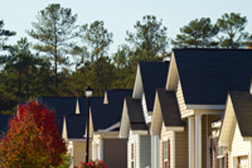 Chapel Hill homeowners George and Deborah Christie filed their home warranty lawsuit in October 2011, just a few months beyond the six-year window since the completion of their custom-built home their contractor released to them in March 2005. The plaintiffs found an issue with the exterior cladding of the home, which allegedly failed and allowed moisture to penetrate into the wood skeleton of the house, threatening its structure.
Chapel Hill homeowners George and Deborah Christie filed their home warranty lawsuit in October 2011, just a few months beyond the six-year window since the completion of their custom-built home their contractor released to them in March 2005. The plaintiffs found an issue with the exterior cladding of the home, which allegedly failed and allowed moisture to penetrate into the wood skeleton of the house, threatening its structure.The lawsuit did not initially make it to trial as a judge with the Orange County Superior Court ruled the action invalid due to limitations entrenched in the state’s statute of repose which, according to The Mecklenburg Times (1/2/14), trumps any warranty or extended warranty. However, the plaintiffs appealed the ruling, with the appeals court finding in favor of the defendants in a 2-1 split.
That judicial split allows for a hearing before the state Supreme Court, which happens January 20.
There are various warranties inherent with the construction of a home, whereby the builder warrants that the new home is habitable and free from construction defects at the time the home is released to the purchasers. Usually, an all-encompassing warranty is for a period of one year. Various products that go into the construction of a home also have implied warranties - and many homeowners purchase home warranty insurance that extends the protection against construction and product defects beyond the initial warranty period.
Many homeowners have had issue with home warranty companies that don’t live up to their obligations or stonewall the insured parties when a problem arises. It is a generally held view that insurance companies are eager to accept revenues derived from premiums, but are not so fond of paying out in response to even legitimate claims.
However, this is not the case here. The plaintiffs allege the exterior cladding chosen by the builder, Hartley Construction Inc. (Hartley), was not appropriate as exterior cladding, and failed.
The product, marketed as GrailCoat, carries a 20-year warranty for waterproofness. The plaintiffs argue, however, that the use of GrailCoat - a synthetic stucco product - was in violation of the state’s building code and, as such, could not be repaired. The plaintiffs also claim that had they waited to seek remedy from the contractor and the product manufacturer, the home would have descended into a much worse condition, potentially making the home completely uninhabitable.
The Mecklenburg Times reports that the plaintiffs had to pay another contractor $160,000 to make repairs to the home - which was already experiencing the first stages of rot from moisture penetration - in order to save the structure. This, according to court documents filed with the North Carolina Supreme Court.
The Mecklenburg Times reports that the Supreme Court will now consider whether GrailCoat, of Orlando, Florida, committed “fraudulent conduct in its advertising” of the cladding material and whether Hartley, the builder of the home, committed “an intentional and/or reckless act by defying the (North Carolina) Building Code” in using the product, which the plaintiffs allege was not approved by the code.
The foregoing arguments were not initially heard by the lower court. This home warranty lawsuit, according to The Mecklenburg Times, hinges on the selection by the original builder of a “non-drainable” or “barrier” cladding system that was similar to other synthetic stucco products that had heretofore been the target of “thousands of lawsuits” over the past decade alleging failure. The plaintiffs allege the cladding material violated seven prohibitions of the state building code in North Carolina.
READ MORE HOME WARRANTY INSURANCE LEGAL NEWS
The case is Christie v. Hartley Construction, Inc., et al., No. COA12-1385.
